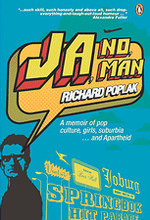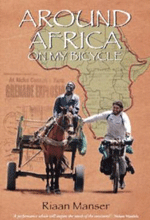|
Ja, No, Man
I found Ja, No, Man by Richard Poplak strangely
troubling. Described as ‘a memoir of pop culture, girls, suburbia…
and Apartheid’ it is all of that, but from a strangely disconnected
viewpoint.
You see, Richard Poplak only lived in South Africa
for sixteen years. And he’s lived out of South Africa for sixteen
more. This is part of his reason for writing the book – his experience
is unique because he lived in the country only during the Apartheid
years. But there is something a little off about his memoirs, something
plotted and unnatural. Perhaps it is his tendency to step in and
out of narrative, telling a story and then commenting on it in a
kind of researched lecturing capacity that takes all the spontaneity
out of the reminiscence, and cuts the reader off from connecting
with the characters. Perhaps it is his pervading sense of white
guilt as he tries to justify the way he treated those around him
as a child, without really offering any real reason.
But I think mainly it is the fact that the reader
can see the writer’s hand. There are whole paragraphs that feel
crafted to the point of lifelessness. Poplak is trying too hard
to be authentically South African, striving for ‘natural’ wit and
colourful metaphors to the extent that it feels artificial.
Which is not to say that the whole book is a write-off,
not at all. There are some beautifully described passages, unique
experiences and fresh observations on his life at that time, and
it is true that the years just before the Apartheid regime crumbled
were fraught with meaning for any South African. In the moments
where he is honest, and not trying to be clever, Poplak’s writing
shines. Unfortunately, these moments are not abundant.
Then again, one has to bear in mind that this is
not necessarily a book intended for South Africans, but rather for
those unfamiliar with what the country was like pre-1994. A guidebook
to a Joburg childhood during Apartheid, if you will. If this was
his intention, Poplak has succeeded. I just wanted more. 
Around Africa on my Bicycle
Rarely do place and literature combine so seamlessly
as in travel writing. The place is, in effect, the engine that drives
the story. In Around Africa on my Bicycle this engine is
the whole continent of Africa which, as the title suggests, is covered
by bicycle. Riaan Manser, the author, is the first man to circumnavigate
the entire African continent by bicycle, a feat which took him through
34 countries and 36 500km in 2 years 2 months and 15 days. Quite
an adventure; quite an undertaking to even attempt, never mind complete.
And yet.
There is something lacking from his account of
the adventure. I love travelling and I love Africa – surely I was
the perfect reader for this book? But I found myself getting tired,
round about page 300 (of 700), not from the stories (which were
mainly exciting and intriguing) but from the ceaseless detail. Now
it could be argued that travel writing has to be about all the details
– the personal ones so that you form bonds with the writer, and
care about him enough to keep going; the physical ones so that you
feel as if you’ve visited (albeit briefly) the place that he writes
about. But at the same time it has to be pacy, and gripping. At
times I found Around Africa on my Bicycle laboured, and a
bit exhausting. A day-to-day account of twenty-six and a half months
takes a long time.
That said, there are many who will love this book
for the inspiration it undoubtedly offers, and I admire Manser for
being brave enough to set off on an adventure that seemed not only
dangerous (politically and physically), but downright crazy. In
that, this book is a success. It will inspire wanderlust in many
a traveller, and no doubt provide a background for those wishing
to visit certain African countries.
And perhaps this is the key. How much of a book’s
enjoyment is derived from the writer, and how much from the reader?
Perhaps Around Africa on my Bicycle is not meant to be read
in one sitting, to be ploughed through day after day. Perhaps it
should be read in chunks, so that each country is a book unto its
own, a slice of adventure from what must have been an extremely
large pie.
Perhaps this armchair traveller isn’t quite up
to travelling around a whole continent just yet.  |
|
|
|
|











![]()
![]()



